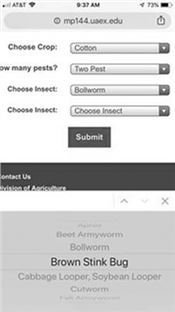|
Division Of Agriculture Launches Mobile-Friendly Pesticide Database
LITTLE ROCK, ARK.
Producers, agricultural agents and consultants will now have access to a comprehensive database of insecticide information at their fingertips, with the University of Arkansas System Division of Agriculture’s launch of a mobile-device-friendly version of the invaluable MP-144, also known as “Insecticide Recommendations for Arkansas.”
Glenn Studebaker, extension entomologist for the Division of Agriculture, said he had received many inquiries in recent years from producers seeking quick access to the recommendations contained in the MP-144 in a more accessible format.
“It’s a 300-page document, so it’s not exactly the sort of thing you keep in your pocket,” Studebaker said. “We’ve had the MP-144 in PDF format on our website for several years, but on a smart phone, that’s not always convenient, either.”
The mobile-friendly version of the publication provides access to pesticide recommendations at http://mp144.uaex.edu/. The site is optimized for mobile devices, including smartphones and tablets, so users can avoid the “pinch and scroll” common to the navigation of older websites not designed specifically for more modern devices. Through a series of drop-down menus, users can select the crop they’re interested in protecting, as well as up to two pests they’re trying to control. The site will then provide a list of appropriate pesticides, including their application rates, restricted entry intervals and other information.
The web page’s functionality was developed by Division of Agriculture information technology specialists, including Steve Hall, the primary developer, Digital and IT Innovation Manager Karen Watts and Information Technology Program Director Amy Cole, who managed the project. Cole and Watts designed the database’s user interface and co-led usability testing.
Cole said the team chose to make the MP-144 available as a mobile-friendly web page rather than a downloadable application because upkeep for a web page tends to be much more manageable than that for an app, distributed either through Apple, Google Play or other centralized “app stores.”
“Those can be really difficult to maintain,” Cole said. “There’s a constant demand for small changes and updates, which can place a huge burden on staff. By making things web-based and mobile-friendly, we’ll be better able to adapt to things with the resources we have.”
Cole said that although users will need an Internet connection to use the online database, the results tend to load quickly, and the page won’t disappear if connectivity is lost.
Currently, the online MP-144 recommendations are limited to row crops, although Studebaker said he is steadily adding recommendations for fruits, garden vegetables and other specialty crops to the database.
Cole said the Cooperative Extension’s Information Technology department hopes to work with Division of Agriculture specialists to also create mobile-friendly versions of the MP-44, which deals with weeds, and the MP-154, which deals with diseases and pathology. ∆

Producers, agricultural agents and consultants will now have
access to a comprehensive database of insecticide information at their fingertips, with the University of Arkansas System
Division of Agriculture’s launch of a mobile-device-friendly
version of the invaluable MP-144, also known as “Insecticide
Recommendations for Arkansas.”
|
|